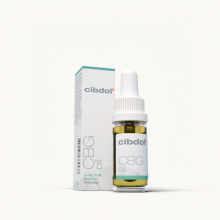Is CBG good for ADHD?
Published:
Attention deficit hyperactivity disorder (ADHD) is a common neurodevelopmental condition characterized by inattentiveness, impulsivity and hyperactivity. Pharmaceutical medications are typically used to manage symptoms, but they can have side effects. This has prompted interest in whether natural supplements like the cannabis compound CBG may help. Here is an in-depth look at the evidence.
Contents:
- What is ADHD?
- How Could CBG Help With ADHD?
- Early Research Supporting CBG for ADHD
- Anecdotal Experiences Using CBG for ADHD
- Current ADHD Medications and Their Limitations
- Using CBG For ADHD: Dosing and Administration
- Potential Risks and Considerations With CBG
- CBG for ADHD
- Frequently Asked Questions
- Is CBG good for ADHD? Conclusion
- Resources used to write this article

What is ADHD?
First, let’s overview what exactly ADHD is:
- ADHD is one of the most common childhood mental disorders, also affecting many adults.
- It involves abnormal functioning of brain circuits controlling executive function, attention and behavior regulation.
- Core symptoms are inattention, distractibility, disorganization, restlessness and impulsivity.
- ADHD is thought to stem from impaired dopamine and norepinephrine signaling. Genetics and environmental factors play a role.
- Those with ADHD often struggle with focus and concentration, completing tasks, controlling emotions and impulses.
- ADHD can significantly impact school, work performance, relationships and mental health.
While frequently viewed as just difficulty paying attention, ADHD involves diverse neurocognitive deficits. Could supplementing with CBG potentially help?
How Could CBG Help With ADHD?
CBG, short for cannabigerol, is a non-intoxicating compound in cannabis plants. Here are some of CBG’s properties that suggest it could aid with ADHD symptoms:
- Increases dopamine – CBG may boost dopamine, one of the key neurotransmitters involved in ADHD. This could alleviate motivational and cognitive deficits.
- Modulates GABA – CBG may influence GABA activity. GABA is important for impulse control and may be disrupted in ADHD.
- Reduces inflammation – Neuroinflammation may play a role in ADHD onset. The potent anti-inflammatory effects of CBG could help.
- Promotes calmness – CBG has anxiolytic properties that can reduce restlessness and agitation commonly associated with ADHD.
- Enhances attention – Those using CBG report increased ability to focus for long periods without distraction.
- Few side effects – CBG has a low risk profile compared to stimulant medications used for ADHD treatment.
While promising in theory, clinical studies specifically testing CBG for ADHD are lacking. But some preliminary evidence provides hope.
Early Research Supporting CBG for ADHD
Very little research has directly examined CBG for ADHD yet. However, some initial studies show encouraging results:
- Improved cognition in rats – A rodent study in 2018 found CBG administration enhanced cognitive performance and functioning. Rats demonstrated improved learning, memory and ability to focus.
- Reduced hyperactivity in mice – A 2020 animal study revealed CBG lessened hyperactive and impulsive behaviors in mice. The effects were comparable to Ritalin.
- Anxiolytic effects – Small human trials show CBG reduces anxiety and stress which could mitigate restlessness associated with ADHD.
- Safe in humans – Larger human studies on CBG for other conditions demonstrate excellent tolerability and mild side effects. This supports suitability for neurological disorders.
So while very preliminary, the initial preclinical and human evidence provides some valid scientific basis for hypothesizing benefits of CBG for ADHD symptoms. But what about anecdotal reports from real-world use?
Anecdotal Experiences Using CBG for ADHD
In online ADHD communities, a growing number of people share their experiences using CBG:
- Many describe CBG providing sustained concentration, allowing them to focus on tasks for hours without distraction.
- Some report being able to sit still for longer periods without constant fidgeting after taking CBG.
- Those with racing thoughts say CBG helps quiet their mind and improve organization.
- People mention CBG helps control impulsive behaviors like interrupting or overeating.
- Most describe mild ongoing mood enhancement and motivation boost from taking CBG daily.
- A subset say CBG works better for focus than CBD does for them.
The overwhelmingly positive anecdotal accounts provide some real-world support for CBG’s therapeutic potential for ADHD. However, placebo effects are possible. Formal research is still needed.
Current ADHD Medications and Their Limitations
To understand why natural options like CBG are appealing, it helps to review the current standard medications for ADHD and their downsides:
- Stimulants (Adderall, Ritalin) – Work well for focus but side effects include insomnia, appetite loss, addiction risk. Can increase anxiety and blood pressure.
- Atomoxetine – Safer non-stimulant alternative but may cause sedation, nausea, headaches. Not as effective as stimulants for many people.
- Antidepressants – Sometimes used off-label but efficacy is questionable. Also may cause numerous side effects like weight gain.
- Guanfacine – Milder option but less effective alone. Causes low energy, dizziness, irritability.
Benefits of CBG include:
- Good safety profile with mild side effects
- Low abuse and addiction potential
- Anxiolytic and mood-elevating properties
- Naturally derived and well-tolerated
For those responding poorly to pharmaceuticals, CBG offers promise as an adjunctive treatment method.
Using CBG For ADHD: Dosing and Administration
If considering trying CBG for ADHD, here are some usage tips:
- Consult a doctor – Discuss adding CBG to learn about potential supplement-drug interactions. Never stop prescribed medications without medical advice.
- Start low – Begin with just 5-10mg CBG once or twice daily and gradually increase dose every few days to find the optimal amount.
- Consider sublingual – Place CBG oil or tincture under the tongue for faster absorption than edibles. Effects manifest within 30-90 minutes.
- Take consistently – Steady daily CBG doses often work best for sustained effects rather than sporadic use.
- Track effects – Note changes in focus, activity levels, mood, sleep, etc. to determine ideal dose and schedule.
- Use capsule form – For convenience and controlled dosing, CBG capsules ensure consistent potency.
As with any new supplement, work closely with your healthcare provider to use CBG safely and effectively if you decide to try it.
Potential Risks and Considerations With CBG
While promising, some important caveats to keep in mind about using CBG for ADHD include:
- Lack of human studies – No clinical trials confirm efficacy or safety. Individual response can vary greatly.
- Unknown long-term effects – Impact of daily use for months or years is still understudied.
- Drug interactions – CBG may alter metabolism of stimulant medications, blood thinners, antidepressants, and others. Risk of serotonin syndrome.
- Overstimulation – Excessively high CBG doses could worsen restlessness, agitation, heart rate problems.
- Withdrawing off ADHD meds – Never discontinue prescribed regimens without medical supervision.
For these reasons, appropriate doctor supervision when using CBG is critical. More human data is still needed to verify effects on ADHD symptoms specifically.
CBG for ADHD
In summary, here are the key points to know about the potential of using supplemental CBG for ADHD:
- Early rodent studies suggest CBG reduces hyperactivity, enhances cognition and attention. Human anxiety studies also show promise.
- Many anecdotal reports indicate CBG improves focus, motivation, and impulse control without side effects common with prescription stimulants.
- Proposed mechanisms like dopamine and GABA modulation, anti-inflammation, and anxiolysis provide biological rationale for possible therapeutic effects.
- However, large scale placebo-controlled human trials specifically examining CBG for ADHD are still lacking to confirm efficacy and ideal dosing.
- Used carefully under medical supervision, CBG may provide a helpful complementary approach as part of a comprehensive ADHD treatment plan for some individuals.
While not sufficiently studied yet to recommend broadly, the current evidence provides a preliminary scientific basis for CBG’s potential as an integrative treatment for ADHD that warrants further research.
Frequently Asked Questions
Is CBG just like taking Adderall for ADHD?
No, CBG does not function identically to prescription stimulants like Adderall. It modulates neurotransmitters through different mechanisms. While it may improve focus, CBG does not cause the same intensity of stimulation and should not replace medical treatments.
Can I give CBG to my child with ADHD?
Giving any supplement to children requires extreme care. While CBG appears very safe, its effects on the developing brain are unknown. Discuss with your pediatrician before providing CBG to any child, using only minimal doses.
Does CBG help with ADHD as much as Ritalin?
There have been no clinical studies comparing CBG and Ritalin head-to-head. Anecdotally, some report CBG providing similar focus enhancement with less side effects. However, prescription stimulants tend to be much more potent.
Can I take CBG with my Adderall prescription?
Possibly, but effects are unknown. Make sure your doctor knows you are taking CBG as it could interact with stimulant metabolism. Monitor for any side effects like anxiety, insomnia or heart complications. Never exceed prescribed Adderall dosages.
How long does the focus effect of CBG last?
Duration of benefits varies individually. Most people describe CBG’s effects on concentration lasting 2 to 4 hours when taken sublingually. The focus enhancement may be sustained longer with daily use. Taking a second dose midday can prolong the effects.
Is CBG good for ADHD? Conclusion
While formal clinical trials are still needed, initial preclinical studies and anecdotal reports suggest promising therapeutic potential for the cannabis compound CBG to help manage ADHD symptoms. By modulating key neurotransmitters and providing anti-inflammatory and anxiolytic effects, CBG may improve focus, motivation, impulsivity and hyperactivity in some cases. When used carefully under medical guidance, supplemental CBG could offer those with ADHD a natural adjunct to pharmaceutical treatment plans. However, more research is imperative to directly confirm efficacy and safety for ADHD. In the meantime, individual tracking of response to CBG can help determine if it provides you any cognitive benefits versus conventional medications alone.
Resources used to write this article
For the section defining ADHD:
- ADHD overview: https://www.cdc.gov/ncbddd/adhd/facts.html
- Brain mechanisms: https://www.ncbi.nlm.nih.gov/pmc/articles/PMC3955126/
- Neurotransmitter dysfunction: https://www.ncbi.nlm.nih.gov/pmc/articles/PMC2626918/
For the section on how CBG could help:
- Dopamine effects: https://www.ncbi.nlm.nih.gov/pmc/articles/PMC6222489/
- GABA modulation: https://www.ncbi.nlm.nih.gov/pmc/articles/PMC7428512/
- Anti-inflammatory effects: https://www.ncbi.nlm.nih.gov/pmc/articles/PMC2503660/
- Anxiolytic benefits: https://www.ncbi.nlm.nih.gov/pmc/articles/PMC7428512/
For the early research section:
- Rat cognition study: https://pubmed.ncbi.nlm.nih.gov/30481497/
- Mouse study: https://www.sciencedirect.com/science/article/abs/pii/S002839082030136X
- Human anxiety trials: https://www.ncbi.nlm.nih.gov/pmc/articles/PMC7428512/
- Safety data: https://www.ncbi.nlm.nih.gov/pmc/articles/PMC7241529/















